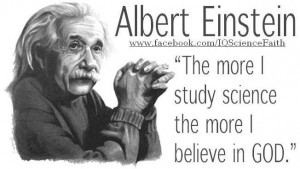 The quote attributed to Einstein, “The more I study science, the more I believe in God,” is getting a lot of play around the interwebs. I though it might be interesting to look at what he might have meant by the statement.
The quote attributed to Einstein, “The more I study science, the more I believe in God,” is getting a lot of play around the interwebs. I though it might be interesting to look at what he might have meant by the statement.
Einstein is also widely quoted as saying, God does not play dice with the universe.” Together, these quotes are oft cited as evidence of scientists believing in God—usually by fundamentalist Christian groups defending themselves against the encroachment of science on their literal interpretation of their mythology.
First, Einstein was neither a Christian or even a Jew. He was raised as a Jew and was schooled as a Catholic. He had ample education in the Abrahamic religions, but rejected them nonetheless.
Still, Einstein is not properly classified an atheist either. He rejected the notion of a personal god. Instead, he said, “I believe in Spinoza’s God who reveals himself in the orderly harmony of what exists, not in a God who concerns himself with fates and actions of human beings.”
In other words, he was a Deist, and was in the spiritual company of Thomas Jefferson, Ben Franklin, George Washington, Ethan Allen, and Thomas Paine. Deists believe that reason and observation of the natural world, without the need for organized religion, can determine that the universe is the product of a creator.
So Einstein’s quote is an observation of the mathematical beauty, the order, the ever unfolding revelation of the inner workings of the universe that he perceived. It’s not remotely an affirmation of the bible.
Einstein’s god never intervened in human affairs or suspended the natural laws of the universe, and absolutely did not have a supernatural existence or the capacity for miracles. This makes Einstein a curious poster boy for Christians in specific, or even theists in general.

Einstein said the word “God” therefore my totally unscientific belief that the world is 10,000 years old, that talking snakes exist, that virgins can be impregnated by deities and that bread and wine magically transform into the body and blood of a dead Jewish carpenter at my local church every Sunday is therefore indisputably true. Oh and anything that other world famous scientist, Darwin says is total phewy.
Darwin actually did his work trying to better understand God.
My belief is this; Any scientist who claims God does not exist is not a very good scientist. Simply because something is not observed does NOT mean it doesn’t exist.
Now Claiming not to believe in God, that is a whole other nut to crack.
My belief is also that nothing is impossible. Too many times in the history of mankind, great scholars and fools decried something as “Impossible”, only to have someone do it 100 years later.
If you believe anything is impossible, you won’t be a very good scientist, as you have already accepted defeat in the search for possibility.
Any good scientists that would weigh in on the topic, wouldn’t say god does not exists. They would say there is no evidence that a god does exist. You can’t disprove a negative.
In fact, I believe invisible green gophers from Neptune invaded the brains of our Founding Fathers and were the ones truly responsible for founding this country.
Since you can’t disprove me and this isn’t “impossible” perhaps you’ll help me get the “green gopher hypothesis” placed in our elementary schools curricula. The kids really should hear both sides of the story and make up their own minds.
Just because you do not believe in God does not mean God is not there. Remember what we call science now was called magic before. The world was flat before it was round. and the bible and revelations given to people about things beyond their time. have some respect and reverence for things that might just be beyond youand your science now.
I’m not sure you’re making the case you intended to make. Yes, what is understood by science today used to be considered magic. But it’s equally true that what is magic/mystery today will likely be our great-grand children’s science. This seems to support the case that God is not required to explain the unexplainable… just better research.
None of which is to say that God doesn’t exist. He might. But there is a paucity of evidence. The point of the article is that asserting that smart dead people held beliefs they did not, is more than a bit disingenuous as proof.
You are more than welcome to have your faith. I do respect that, even if I don’t share it.
Yeah let’s just gloss over the issue of whether Einstein actually even said it. SMH.